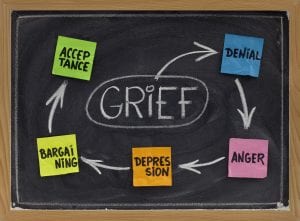The Five Stages of Grief

Since the book was published, “The Stages” theory has helped many people understand their feelings after the loss of someone close to them.
Of course, everyone experiences grief differently so you may not feel each of the Stages as they are defined in a “textbook” way. The important thing is that you recognize that the feelings you may be having are normal.
- Denial — At first, you may feel numb or as if you are in shock. It’s hard to believe that your loved one has actually died and will no longer be a part of your life. You may find yourself thinking that “it cannot possibly be.” During the denial stage, many people withdraw and isolate themselves from others.
- Anger —You may be angry at the person who has died, the situation, your family members, the doctor, or even yourself. Most experts recommend that you recognize your anger for what it is and you allow yourself to work through it.
- Bargaining — You may try to make a deal with a higher power so that your loved one will not be ill or die. Understandably, you want things to go back to the way they were. Your mind may also be filled with a lot of “only ifs” and “what ifs.” Only if one more procedure is done, only if we had done… Going through this stage can help you deal with the aftermath of the loss.
- Depression — You may feel overwhelming sadness and emptiness. It may be hard to go about daily activities. This is a very natural reaction to a loss. While it is not unusual to feel depression after a loss, you may be concerned about these feelings. If you are worried about how you feel, do not hesitate to seek help.
- Acceptance — After some time you will begin to feel that things will be OK. You may never get over missing the person you have lost, but you feel ready to move on.
The Real Meaning of the Five Stages of Grief
Dr. Kübler-Ross’ stages have been applied to grief and other forms of personal loss, such as loss of a job or onset of a disability. In her book, On Grief and Grieving: Finding the Meaning of Grief Through the Five Stages of Loss, Dr. Kübler-Ross says:
“The stages have evolved since their introduction, and they have been very misunderstood over the past three decades. They were never meant to help tuck messy emotions into neat packages. They are responses to loss that many people have, but there is not a typical response to loss, as there is no typical loss. Our grief is as individual as our lives.”
She goes on to say of the 5 stages:
“They are tools to help us frame and identify what we may be feeling. But they are not stops on some linear timeline in grief. Not everyone goes through all of them or goes in a prescribed order.”
Key Points to Remember About the Five Stages of Grief
- You may not experience each of the Five Stages in a stepwise manner.
- You may find yourself alternating between Stages. For example, an individual may move back and forth between anger, bargaining, and depression.
- There is no timetable for grief. How long it takes to move through the stages will vary widely from person-to-person.